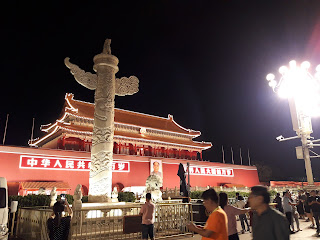The world may not forget China's 1989 crackdown on pro-democracy demonstrators in Tiananmen Square, Beijing. But the world may not know the extent of human casualties during the gory episode either.
The events on and around the central Beijing square on June 4, 1989, when Chinese troops opened fire to end the student-led pro-democracy protests, are not publicly discussed in China and the anniversary is not officially marked.
 |
| File snap: Blogger at Tiananmen Square |
Public commemorations take place in overseas cities including Taipei, where senior Taiwan government leaders often use the anniversary to criticize China and urge it to face up to what it did.
The Tiananmen Square massacre, which took place on June 3-4, 1989, involved the Chinese government's violent suppression of pro-democracy protesters in Beijing's Tiananmen Square.
The protests, which began in April 1989, were fueled by demands for free speech, democratic reforms, and an end to corruption. The government responded with martial law and ultimately sent the People's Liberation Army to disperse the demonstrators, resulting in numerous deaths and injuries.
(Police officers stand guard during a stop and search near Victoria Park in Hong Kong on Tuesday ahead of the 36th anniversary of the crackdown on pro-democracy demonstrators at Beijing’s Tiananmen Square. - snap Reuters/The Japan Times)
"The commemoration of the June 4 Tiananmen incident is not only to mourn history, but also to perpetuate this memory," said Taiwanese President Lai Ching-te, in a post on Facebook on Wednesday.
Lai is dubbed by Beijing as a "separatist" and has rejected his repeated offers of talks.
"Authoritarian governments often choose to silence and forget history, while democratic societies choose to preserve the truth and refuse to forget those who gave their lives — and their dreams — to the idea of human rights," Lai said.
"Not only do we refuse to forget history, we will implement our core values every day."
U.S. Secretary of State Marco Rubio on Tuesday praised the courage of the Chinese people who were killed in the bloody crackdown.
"Today we commemorate the bravery of the Chinese people who were killed as they tried to exercise their fundamental freedoms, as well as those who continue to suffer persecution as they seek accountability and justice for the events of June 4, 1989," Rubio said in a statement.
"The CCP actively tries to censor the facts, but the world will never forget," he said, referring to the Chinese Communist Party.
Before dawn on June 4, 1989, Chinese tanks rolled into Tiananmen Square, crushing weeks of pro-democracy demonstrations by students and workers.
Human rights groups and witnesses say the figure could run into the thousands. China blamed the protests on counter-revolutionaries seeking to overthrow the ruling Communist Party.
The Tiananmen Mothers, which represents relatives of those killed, put out this week their annual statement calling for a public accounting of what happened.
"The executioners of that year have passed away one after another, but as the continuation of the ruling party, the current government has a responsibility to respond to and address the Tiananmen Massacre," Zhang Xianling, whose son Wang Nan was killed, said in a video message.
In Hong Kong, where thousands used to gather to mark the anniversary before China's imposition of a national security law in 2020, security was tight around Victoria Park, the site of the previous mass candlelight vigils.
Hong Kong leader John Lee said on Tuesday that police would take stringent enforcement actions against any acts endangering national security. A performance artist was forced to leave the vicinity of the park and a shop selling small white candles was raided by customs officials on Tuesday.
Thirty-six years after the killing of countless peaceful pro-democracy protesters in Beijing, the Chinese government still seeks to erase the memory of the June 1989 Tiananmen Massacre, Human Rights Watch said today. The authorities should cease censorship of the crackdown, allow commemorations, provide compensation to the victims’ families, and hold accountable officials responsible for abuses.
As in previous years, as the June 4 anniversary approaches, authorities across China are making a preemptive crackdown on commemorations, notably those by members of the Tiananmen Mothers, a group of relatives of Tiananmen Massacre victims.
One prominent member, Zhang Xianling 87, told Radio Free Asia that even though she could barely “walk 200 meters without a wheelchair,” the authorities continue to subject her and others to strict surveillance and restrictions on her movement.
'Time' magazine says -
The government also uses state-of-the-art censorship tools to erase mention of a number of politically sensitive search terms or to redirect the user toward other subjects. Video recognition software can detect images related to the square and its bloody history.
In short, China’s leaders have come as close as technically possible to erasing all record of what happened.
On the other hand, the Chinese Communist Party leadership has presided over the largest economic expansion in human history. In 1989, when adjusted for differences in purchasing power, China’s economy generated just 4.11% of global GDP.
Today it’s 19.24%. There is an obvious human dimension to this success. Market reform in China has undeniably lifted hundreds of millions of people from poverty.
Nearly two-thirds of the population lived on $1.90 per day or less in 1990. In 2015, it was less than 1%. Per capita income increased by more than 900% over that period, and infant mortality rates fell by more than 80%.
Thirty years after the murders in Tiananmen Square, China presents a contradictory legacy. Its leadership has provided opportunities for a better life to a larger number of people than any government in history.
And China remains a police state, where citizens can’t publicly acknowledge that this mass murder ever took place.
ends








No comments:
Post a Comment